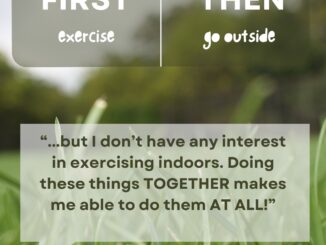One of the most asked questions that I ever get—both in comment form, and in email form. I finally took the time to really write out a very long post answering it.
Q: How can I help my child when they’re already at the crisis point—the point of melting down, hitting, kicking, throwing, etc? Assuming I’ve done all I can to try to head off the meltdown…what do I do when it happens?
The one word answer: Survive.
The much, much longer answer:
As much as I possibly can, in the moment when my kid is already melting down and it’s too late to teach emotional regulation or whatever, I am dropping whatever expectations I can. My thought becomes safety.
If that means take dinner off the stove so it’s not a nervous thought in the back of my head, then that’s fine. If that means turn on a show to distract the other kid while I take this one in the other room to settle themself, then that’s fine. If that means kid #2 found a bag of chips I left out on the counter and is eating them, and I am a little annoyed because we were just about to have lunch and those chips weren’t on the menu, I let it go.
What is important for the family’s safety? Sometimes that means taking the child having the meltdown into somewhere else safe, with you. There have been phases, and some kids prefer, some alone space to rage by themselves—so it might look like giving them the space to do that, i.e. in their room, while they know you’re outside their door or close by and checking in. Some kids don’t do well with that and do better if you’re there with them. (I have one of each.)
You DO NOT have to be with your kid entirely for every second of their meltdown or else you’re leaving them alone or abandoning them in their feelings or whatever it is that it’s easy to feel by reading other parents’ accounts of how much they just snuggle their melting down kid and it totally fixes them or whatever. That’s so unrealistic.
I say this so that you can know how much I mean it: I’m pretty sure like two or three days ago I shouted at my melting down kid (who chased me into the other room to throw train tracks at my head), “HEY. I’m leaving you alone! I’m not even bothering you! Now you leave ME alone!” Because my strategy was pretty much that I needed to ignore them for like five minutes while I finished the 2 things that would let me put the other kid to bed, so I could go focus on them singularly and specifically.
Is that the best strategy the world has ever known? Probably not. Is it what I need sometimes? Yes and I was also wearing earplugs at the time to muffle the noise so I didn’t lose my mind entirely. Sometimes that’s realistic. You can’t give 100%, 100% of the time. You model your body and your boundaries and that’s important, too.
Kids at different ages/different stages hit, throw, kick, etc for different reasons. A young toddler hits in an impulsive, reactive type of way—you took my thing, I whack you! Those types of hits are different to block than an older child who might be crying, threatening, verbally fighting with you, etc. They might be doing it in a “I want you to see how angry I am” sort of way where they’re begging to be seen; they might be doing it in a “my body is so full of tension that I’ve got to release it somehow” sort of way where they’re trying to get physical exertion out; they might be doing it in a “I’m hurting so bad that I want you to hurt too” sort of way where they’re really trying to cause damage. Sometimes safety means removing yourself from the situation, sometimes safety means removing them from the situation, sometimes more physical guidance (holding their hand, physically blocking, etc), sometimes less (removing yourself, walking away, etc).
I sometimes end up bear hugging my kid, when they’re going to resort to whatever physical attack they have to (biting, scratching, etc) if I’m blocking individual hits or kicks. The intensity of their anger used to last a long long time. After years of this practice, it usually fades into sadness/fear/whatever was hiding underneath after about 5 minutes, so I just give them a big bear hug with as much freedom of movement as I can safely do for my own self and for them, and take deep breaths myself and usually try to count to 100 (something usually happens before 100 and I get cut off; 100 gives me the chance to try to remember that this really isn’t taking that long and that it will come to an end eventually).
There was a time, with my child, when safety meant that we get into their room and shut the door as fast as possible and I sit in front of the door (inside, i.e., me in there with them) blocking it while they went around raging and throwing stuff in their room. (And, part of the preemptive work: everything in their room was safe for throwing. Stuffed animals, feathers, pom poms, clothes, pillows, etc.)
Right now that doesn’t work for us anymore: instead I will steer them to the couch, or just grab them and sit down on the floor if we have to, and just hold them and rock them and not say anything until they defuse from anger into tears and then I might be able to sing to them or coo about them being my baby or whatever. That means I’m physically fighting/wrestling them sometimes during the anger phase as they try to scratch me and hit me, I’m holding their hands so they can’t do that and I do my best to keep my voice gentle and if I say anything at all it’s “I’m not mad, I know you’re angry, I just can’t let you hurt me, you’re safe,” etc.
(I’m not saying I do these things perfectly all the time, but we do the best we can when we can, right?)
What has worked for me is getting exactly one “calm down phase/place” like this and just practicing that scenario over and over, because when I try to do things on the fly is always when I end up screaming or yelling or (accidentally) hurting my kid because I used too much force to try to stop them from x. It’s usually when my brain is yelling at me that if we don’t get xyz done in the next [amount of time] then…….??? Who knows what I’m worried about, but it feels like a threat and so I react like it’s a threat. I try to force them to get dressed with too much force and then I’m basically wrestling pants onto a flailing octopus. Or I go to block them from throwing something when they’re mad and they throw it anyway and then I scream at them, which accomplishes nothing because the thing is already thrown and now I’m further escalating the situation.
If I can manage to summon up playfulness I’d say that works about 80% of the time (unless they’re already really and truly mad and gone), but it’s really hard for me sometimes. A book called “Playful Parenting” has been helpful in bolstering my skills in that area.
“What do I do in the moment?” Survive, get through the moment, assume that whatever they say or do is because of “the moment” and not a reflection of their true personality or who they will be as an adult or whatever. My child was saying the other day that they was going to break the light fixture in their room and I was taking it so personally. Another time they was saying they were going to pee on their bed. These were both just them being mad in the moment. I stayed with them until it was over — so they couldn’t pee on the bed, or break the light, out of a momentary impulse. But long-term, when regulated, they weren’t like, “Excellent, now that I have expressed my bed peeing desires and my mom didn’t immediately tell me ‘No, that’s not allowed,’ I will assume it is allowed and return to my stated goals.” Nah, they were just mad and said dumb stuff when they were mad. When they weren’t mad anymore, they moved on to other things with their life.
The bulk of the work of this type of parenting is in doing everything you can do before the moment. It’s funny, because I see parallels to that in my OT work — not about anger or meltdowns, but about play. The bulk of the work I’m doing is in brainstorming what stations to set up in my room, what toys to have access to, what loose materials to have out, what new kinds of play to bring in, and how each one might relate to the goals that my kids have on their IEPs…then during the actual session, we mostly just play. And sometimes some unexpected thing happens and I have to react to it on the fly, but mostly, we just get to play.
In the same way, the bulk of this parenting work is in setting up the environment, the demands on your child, figuring out what helps them and what works and doesn’t. And it’s a lot of trial and error sometimes, and your child becoming dysregulated may or may not have anything to do with you — it could also be a zillion other things; it doesn’t reflect on you or your parenting at all. But the bulk of the work is up front, setting them up for success. And then when it happens, when something unexpected happens…you all just get through it. You all survive. If nothing else, you’re modeling how to weather catastrophe with as much grace as possible, and that’s important too.



